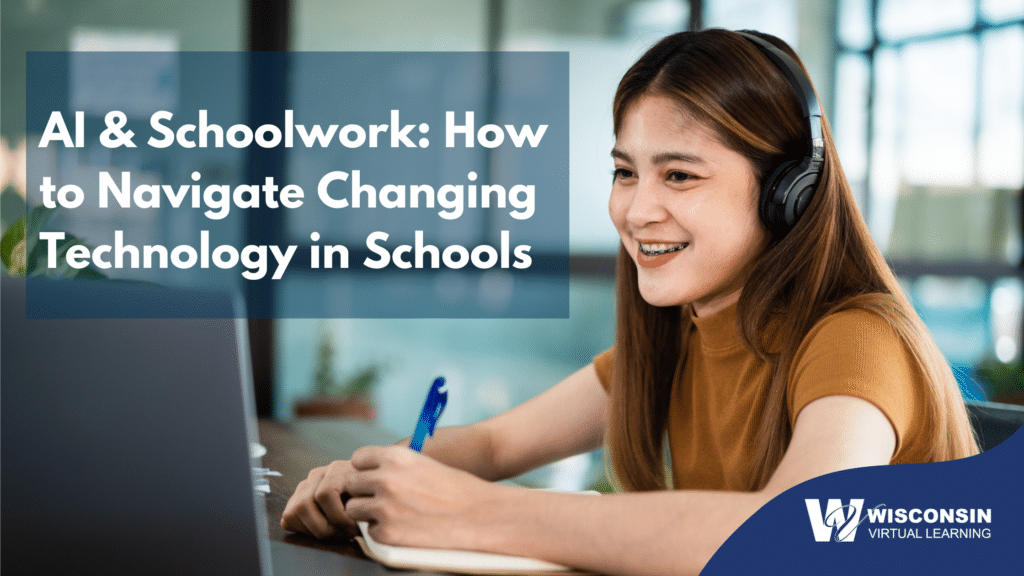Imagine a world where your child logs into a virtual public school and is greeted by a friendly AI tutor tailored to their specific learning style, patiently guiding them through a challenging math problem. In another space, teachers collaborate with sophisticated software that analyzes student data, pinpointing areas of individual strength and identifying students who might need extra support.
This isn’t science fiction; it’s the potential future of education. A future where Artificial Intelligence (AI) is no longer another ubiquitous and vaguely intimidating buzzword but a powerful and effective tool capable of revolutionizing the way children learn.
As a parent considering or already navigating the unique, flexible landscape of virtual public school for your children, the introduction of AI may naturally raise questions. Will robots replace teachers? Will AI dehumanize the learning process? Will children become just data points in an impersonal algorithm? These are all valid concerns, so addressing them head-on is vital.
Debunking Myths About AI and Schoolwork
Early adoption of AI in schools brings forth many opportunities and challenges. From automating routine administrative tasks to personalizing learning experiences, AI has the potential to revolutionize how students engage with their teachers and their schoolwork. As with any new, revolutionary technological advancement, though, there are also many myths and misconceptions.
The first step to understanding how AI will potentially shape education moving into the future is to sort through this confusion.
Myth 1: AI replaces teachers
Entirely false. AI technology acts as support, not as a replacement. Think of it as a tireless, highly personalized learning assistant that frees up teachers’ time for more enriching human-to-human interactions.
AI can manage repetitive tasks like grading certain assignments and providing basic instruction, allowing virtual and in-person educators to focus more on individualized feedback and creative activities and nurturing crucial curiosity in young learners.
Myth 2: AI dehumanizes learning
Again, this is simply not true. AI can actually personalize learning, making it more engaging and more relevant to each student’s wholly unique needs.
Imagine interactive lessons that adapt perfectly to your child’s pace and learning style, offering targeted support and encouragement along the way. This tailored approach can foster a deeper connection with the material being explored and ignite a life-long love for learning.
Myth 3: AI turns students into data points
While AI uses data, it’s crucial to understand that ethical practices and privacy are paramount. Responsible virtual schools ensure data is anonymized and used solely for enhancing learning experiences, not for surveillance, control, or privacy invasion.
How to Maintain Integrity and Trust in the AI Era
It’s understandable to have concerns about the potential downsides of AI, especially about things like the misuse of tools like generative programs for cheating. However, it’s important to remember that integrity and trust are the cornerstones of effective learning, and these values will remain just as crucial in the AI era as ever.
Virtual schools that embrace AI responsibly prioritize fostering a culture of academic honesty and intellectual curiosity. This means providing robust safeguards against potential misuse while nurturing open communication and a supportive learning environment. Students are empowered to utilize AI tools strategically, understand their strengths and limitations, and ultimately develop their own critical thinking and problem-solving skills.
How Can Parents Navigate AI Use for Students?
Ultimately, trust and respect form the bedrock of a successful virtual learning experience. Parents can play a vital role by encouraging open dialogue with their children about responsible technology use, emphasizing learning over quick fixes, and celebrating genuine academic achievements. In this collaborative environment, where educators, students, and parents work together with mutual trust and respect, AI can foster curiosity, integrity, and lifelong learning.
As a parent or guardian, here’s how you play your part to best support your student in this exciting new world:
- Stay informed: Ask your virtual school about their AI practices, data security measures, and ethical standards.
- Communicate with your child: Encourage open dialogues about AI and address any concerns they might have.
- Promote critical thinking: Teach your child to evaluate information sources, question AI-generated recommendations, and develop healthy skepticism toward technology.
Remember, AI is just a tool; its impact depends on how and when it’s used. By embracing its potential responsibly and working together, students, parents, and educators can ensure that AI empowers young learners to thrive in a rapidly changing world.
As you navigate the shifting landscape of education, consider how Wisconsin Virtual Learning can provide a personalized and flexible approach to support your child’s unique learning journey.

